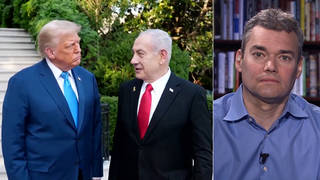
Guests
- William Arkinlongtime NBC reporter and analyst leaving the network for warmongering and encouraging a “Trump circus.” He is the author of many books, including Top Secret America: The Rise of the New American Security State.
Longtime NBC reporter and analyst William Arkin announced he was leaving the network last week in a blistering letter that took aim at the mainstream media for encouraging perpetual warfare and bolstering the national security state. In his letter, Arkin writes of Trump, “Of course he is an ignorant and incompetent impostor. And yet I’m alarmed at how quick NBC is to mechanically argue the contrary, to be in favor of policies that just spell more conflict and more war. Really? We shouldn’t get out Syria? We shouldn’t go for the bold move of denuclearizing the Korean peninsula? Even on Russia, though we should be concerned about the brittleness of our democracy that it is so vulnerable to manipulation, do we really yearn for the Cold War? And don’t even get me started with the FBI: What? We now lionize this historically destructive institution?” We speak with Arkin in New York City. He is the author of many books, including “Top Secret America: The Rise of the New American Security State.”
Transcript
AMY GOODMAN: This is Democracy Now!, democracynow.org, The War and Peace Report. I’m Amy Goodman, with Juan González. We’re talking with Bill Arkin, longtime NBC reporter and analyst, leaving NBC after many years, wrote a letter that’s been called the perpetual war letter, critiquing the network, his own and the others, for encouraging, quote, “the Trump circus.” His award-winning reporting has appeared in major newspapers around the country, from The New York Times to The Washington Post, author, among other books, Top Secret America: The Rise of the New American Security State. I’m Amy Goodman, with Juan González. Juan?
JUAN GONZÁLEZ: Bill, I wanted to ask you about another mention in your letter, where you say, “As perpetual war has become accepted as a given in our lives, I’m proud to say that I’ve never deviated in my argument at NBC (or at my newspaper gigs) that terrorists will never be defeated until we better understand why they are driven to fighting. And I have maintained my central view that airpower (in its broadest sense including space and cyber) is not just the future but the enabler and the tool of war today.” On both of those issues, the question of understanding what drives the terrorists and also this whole issue of airpower and the particular perspective that you have on it?
WILLIAM ARKIN: Well, OK, so we have a way of war. And there’s an American way of war. There’s a Russian way of war. There’s an old-fashioned way of war. And when the United States engages in warfare in the Middle East and parts of Africa, as it does today, it does so in a certain way. Yes, it’s true that there are special operations commandos on the ground, and they in fact get down into the dirt and into the mud with the people that we’re fighting. But, by and large, the American military is highly technical, information-dominant, dominated by aircraft, drones, space, cyber, etc. It’s not necessarily the tool that is synonymous with the enemy.
So, we don’t do very well in those conflicts, in a way, because there’s a disproportionate amount of lethality and force between the two sides. But, more importantly, the American way of war is to be very precise, and that’s not necessarily what is appropriate in fighting a conflict in Syria—if you believe that we should be fighting in Syria in the first place. So, it shouldn’t be surprising to most people that the United States, when it bumbles into these countries in the Middle East and Africa, doesn’t do very well. And when we even try to “teach” our allies on the ground how to be better fighters, how to be better militaries, we make an error of trying to make them emulate ourselves. And that’s not necessarily, either, what is needed.
So, we have two problems. One is, we have a presence in the Middle East, which has grown enormously since 9/11. I believe that that military presence, in itself, provides the stimuli for the creation of more terrorists. Everyone has said this since 2001, but it has really reached a crisis point today, because even as the Taliban were defeated or al-Qaeda was driven into a small number or as the United States was able to maintain some level of security in Iraq, what happened was new groups emerged, new groups kept popping up. And now we see ISIS. We see al-Shabab in Somalia. We see new organizations emerging in Niger and Mali etc.
So, the net assessment of our presence in the Middle East, first of all, has to be: What is it that is about our presence itself that is the stimuli for the creation of both local and foreign fighters and their growth? And then, second, what is it about our military and the use of our military forces that is inappropriate or not appropriate for the conflicts in which we fight?
Now, you might not want to be in the Middle East at all, and you might not want to be in Africa. I could make a very strong argument that we should just get out of Afghanistan altogether, that there’s no reason for us to be in Syria, that it’s ridiculous for us to be fighting in North Africa, etc. But at the same time, when we are there, we’re not applying military force in a proper way.
So there’s a sort of double analysis that’s required, both a strategic analysis, at the highest level, which we’ve failed to do because we don’t have qualified civilians in positions of national security leadership, and, second, this sort of more tactical analysis that the types of wars we fight, we do in the wrong way.
AMY GOODMAN: William Arkin, how many countries is the U.S. bombing now?
WILLIAM ARKIN: We’re bombing nine countries. Well, we have, in the last year, bombed nine countries, from Mali, Niger, Somalia, Libya, and then, in the Middle East, it’s Pakistan, Afghanistan, Iraq, Syria.
JUAN GONZÁLEZ: And you’re not counting Yemen in that, because of Saudi—
WILLIAM ARKIN: Yemen. And Yemen.
JUAN GONZÁLEZ: Yeah, OK.
WILLIAM ARKIN: And Yemen, yeah. So, that’s it. And previously, there was some fighting going on in Uganda. And even as we speak about the drug problem in Latin America, you know, there’s military action that is taking place on a day-to-day basis in Colombia, Ecuador, some parts of Central America, as well. You know, the United States still has forces in Honduras, etc.
So, really, the scope and scale of the American military actions around the world is far greater than what most Americans perceive. But again, let’s be clear about diagnosing the issue. It’s less and less manpower-intensive. It’s more and more focused on drones. It’s more and more focused on airpower. It’s more and more focused on space and cyber. And so we don’t see the kinds of injuries and deaths that we were seeing a decade ago during, say, for instance, the surge in Iraq. It’s become more invisible as a result of the style of American warfare. And as a result of that, it’s almost as if the national security state has the ability to do what they want to be doing autonomously, with very little intervention on the part of civil society.
AMY GOODMAN: And, William Arkin, you also write, “don’t [even] get me started with the FBI: What? We now lionize this historically destructive institution?”
WILLIAM ARKIN: Well, there’s a crazy collateral damage of Donald Trump. And that is that there are a lot of liberals in America who believe that the CIA and the FBI is going to somehow save the country from Donald Trump. Well, I’m sorry, I’m not a particular fan of either the CIA or the FBI. And the FBI, in particular, has a deplorable record in American society, from Martin Luther King and the peace movements of the 1960s all the way up through Wen Ho Lee and others who have been persecuted by the FBI. And there’s no real evidence that the FBI is either—is that competent of an institution, to begin with, in terms of even pursuing the prosecutions that it’s pursuing. But yet we lionize them. We hold them up on a pedestal, that somehow they are the truth tellers, that they’re the ones who are getting to the bottom of things, when there’s just no evidence that that’s the case.
AMY GOODMAN: And what do you mean by the “creeping fascism of homeland security”?
WILLIAM ARKIN: You know, I was against the creation of the Homeland Security Department in 2003, to begin with. First of all, don’t like the word. “Homeland security” sounds a little bit brown-shirty to me. But, second of all, it was created to be a counterterrorist organization, a domestic counterterrorist organization. And all during the Obama administration, we heard Janet Napolitano, the secretary of homeland security, saying, “You know, we are counterterrorism.” But since then, we’ve seen they’re creeping into cybersecurity. We’ve seen them creeping into election security. We’ve seen ICE and TSA become the second and third largest federal law enforcement agencies in the country. And so, now homeland security sort of has become a domestic intelligence agency with really an unclear remit, really with broad powers that we don’t fully understand.
And we tend, again, to say “Donald Trump’s Homeland Security Department.” Donald Trump couldn’t find the Department of Homeland Security if somebody set him on the streets of New York—of Washington, D.C. So it’s not Donald Trump’s Homeland Security Department. It’s our Homeland Security Department. And I think it’s important for us to recognize that this is a department that is really operating on its own behalf and out of control.
AMY GOODMAN: We have to leave it there. Since your letter on perpetual war has gotten so much attention, leaving NBC, has NBC interviewed you?
WILLIAM ARKIN: NBC has not interviewed me, but I’m gratified to the responses that I’ve gotten.
AMY GOODMAN: I’m Amy Goodman, with Juan González. Our guest, William Arkin, has just left NBC.












Media Options